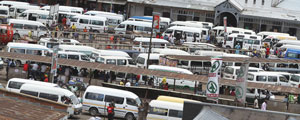
Much has been said about the proposal by Transport and Infrastructural Development minister Obert Mpofu to introduce urban tollgates to decongest cities, but little has been done to interrogate the feasibility of such plans in the context of Zimbabwe. Guest Column Everson Mushava
Interestingly, some local authorities, notably Harare and Gweru, have rushed to embrace the concept, saying this would allow them to raise more funds to improve the conditions of roads.
The proposal has been met with mixed feelings. Some people feel it’s the best way to go, but the majority feel it’s an unscrupulous way of stealing their hard-earned cash.
The argument against the proposed urban tollgates is bolstered by the fact that not much has been done on our roads using money raised from tollgates set up on our highways about five years ago.
Our major highways are still in a deplorable state, with potholes that have continued to pose a threat to lives. Many accidents that have claimed lives on our major roads have been caused by the poor condition of our roads, particularly on the Beitbridge-Harare highway.
But despite many complaints, Mpofu has remained steadfast in his proposal to introduce the urban tollgate.
“We will look at it with the view to address this anomaly in order to decongest our towns and generate revenue,” Mpofu said, insisting “there is no reason why tollgates should be built away from towns where most traffic is”, and describing urban tolling as “logical”.
The urban tollgates, he said, would boost the budgets of municipalities and ultimately result in better road infrastructure.
- Chamisa under fire over US$120K donation
- Mavhunga puts DeMbare into Chibuku quarterfinals
- Pension funds bet on Cabora Bassa oilfields
- Councils defy govt fire tender directive
Keep Reading
“Any new progressive initiative attracts resistance, but I am sure every motorist in the country would want to drive on safe, wide and well-maintained roads. This is the ultimate that our motorists will get,” the minister said.
The minister said roads in urban centres, which are managed by the local authorities, were in a bad state compared to the highways which are maintained by the Zimbabwe National Roads Authority (Zinara).
Mpofu’s controversial plans, which come in the wake of an increase in vehicle tax by Zinara, cannot just go unchallenged.
While the idea is noble, it is important for the minister to realise that coming up with measures to deter people from using their private vehicles in the absence of a vibrant public transport system will create serious problems to the country’s economy.
The move will create grave transport blues that could weigh heavily on companies that will lose several production hours as a result of people reporting late for work. The use of private vehicles by motorists is not a luxury, but a necessity because the country’s public transport system is in shambles.
Mpofu said the system had worked well in developed countries, but forgot to explore factors that have helped in ensuring that such a programme succeeds. The system has been successfully implemented in some cities around the world, especially in Europe, because there is an efficient public transport system and the use of personal vehicles is just but a luxury.
In world cities such as London, Bejing, Stockholm and Oslo, yes, urban tolling has led to the reduction of private vehicle use because there are alternative means of transport.
There are efficient subway systems that maintain strict timetables, at roughly five-minute intervals. There are also cycle tracks for the majority of people who use bicycles to go to work.
To add to these, there are also buses with fixed timetables that ply the routes providing wide commuting options for the public.
But for Zimbabwe, a country without a single functional train, or conventional buses plying urban routes, to jump all these stages and force motorists to abandon using their own personal vehicles would create serious consequences.
But then minister Mpofu is known for devising ways to milk the cash-strapped population. When he was at the Ministry of Mines, he hiked mining licence fees to margins that elbowed emerging businesses out. Now, less than 100 days after taking charge of the Transport ministry, he has raised vehicle licence fees and plans to further fleece motorists through this vehicle toll system.
Whatever implementation mechanism the minister is coming up with in the urban tolling project, he should have first focused on infrastructural development. There is need to revamp the public transport system so that it is safe and reliable.
Needless to say, the countries that have implemented the urban tolling system have an organised settlement pattern, like blocks of flats that allow people to depend on one mode of transport, like a one railway line.
Moreover, besides earning peanuts, Zimbabweans are already burdened by high taxes. Cde Minister, motorists are already suffering from high vehicle maintenance caused by the poor state of roads.
Maybe you do not feel it because you do not pay tollgates and your official vehicles are repaired by the taxpayers. Taxpayers are already paying enough for infrastructural development; do not force them to pay more for your mismanagement. [email protected]











